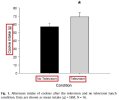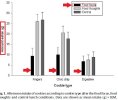There is a subject that can be considered of public utility lol.
You have probably heard this expression from an aunt, grandmother or even your mother, which was more used in the past, when the internet was not available to practically everyone as it is today. But the truth is that, YES, television can indirectly contribute to this. The researcher Suzanne Higgs, together with her collaborators, evidenced this statement in some studies.
In 2009, 16 girls around 19 years old and with a eutrophic BMI (weight appropriate for height) were divided into two groups. Both groups initially received a sandwich for lunch that contained the same nutritional value (about 400kcal). The difference is that one group watched TV while consuming the meal while the other group did not. All the girls consumed their lunch in full. About 2h30min later, in the afternoon snack, cookies were made available to these girls, who could consume them according to their appetite. The amount consumed by each group was counted and the result was that the group that watched TV while having the first meal consumed more cookies than the group that had the first meal without the TV.
The reason for this would be that the fact that the individual pays attention to his meal and chewing causes this to reduce his appetite for the next meal, due to the memory of the previous meal. When the individual then eats a meal in a distracted manner, he tends to eat more at the next meal. And to further elucidate this, Higgs, in 2011, separated 29 girls into 3 groups. All received meals with the same nutritional value. Group [1] had a meal with a full focus on their meal. The group [2] had the meal while reading the newspaper. Group [3] had the meal as usual. About 2 hours later, cookies were made available again for everyone to consume at will. Result: group [1] consumed the least cookies, group [2] consumed the most, while group [3] was between the other two groups.
CONCLUSION:
- Knowing that the materials that make up the TV don't have calories, so, obviously, the answer is NO, the television, in itself, doesn't make you fat.
- However, given the important role of memory related to attention during the meal, distraction can lead to higher calorie consumption at the next meal. So the answer is now YES!
- Replacing television and newspapers with cell phones and social networks, the same can happen with today's people, who eat their meals with their smartphones.
- People who want to lose fat and tend to feel hungry more easily, may benefit from paying more attention to the meal, leading to greater adherence to the diet and, consequently, achieving greater success in the weight loss process.


References:
Higgs S, Woodward M. Television watching during lunch increases afternoon snack intake of young women. Appetite. 2009 Feb;52(1):39-43. doi: 10.1016/j.appet.2008.07.007. Epub 2008 Jul 23. PMID: 18692103.
Higgs S, Donohoe JE. Focusing on food during lunch enhances lunch memory and decreases later snack intake. Appetite. 2011 Aug;57(1):202-6. doi: 10.1016/j.appet.2011.04.016. Epub 2011 May 4. PMID: 21569808.
You have probably heard this expression from an aunt, grandmother or even your mother, which was more used in the past, when the internet was not available to practically everyone as it is today. But the truth is that, YES, television can indirectly contribute to this. The researcher Suzanne Higgs, together with her collaborators, evidenced this statement in some studies.
In 2009, 16 girls around 19 years old and with a eutrophic BMI (weight appropriate for height) were divided into two groups. Both groups initially received a sandwich for lunch that contained the same nutritional value (about 400kcal). The difference is that one group watched TV while consuming the meal while the other group did not. All the girls consumed their lunch in full. About 2h30min later, in the afternoon snack, cookies were made available to these girls, who could consume them according to their appetite. The amount consumed by each group was counted and the result was that the group that watched TV while having the first meal consumed more cookies than the group that had the first meal without the TV.
The reason for this would be that the fact that the individual pays attention to his meal and chewing causes this to reduce his appetite for the next meal, due to the memory of the previous meal. When the individual then eats a meal in a distracted manner, he tends to eat more at the next meal. And to further elucidate this, Higgs, in 2011, separated 29 girls into 3 groups. All received meals with the same nutritional value. Group [1] had a meal with a full focus on their meal. The group [2] had the meal while reading the newspaper. Group [3] had the meal as usual. About 2 hours later, cookies were made available again for everyone to consume at will. Result: group [1] consumed the least cookies, group [2] consumed the most, while group [3] was between the other two groups.
CONCLUSION:
- Knowing that the materials that make up the TV don't have calories, so, obviously, the answer is NO, the television, in itself, doesn't make you fat.
- However, given the important role of memory related to attention during the meal, distraction can lead to higher calorie consumption at the next meal. So the answer is now YES!
- Replacing television and newspapers with cell phones and social networks, the same can happen with today's people, who eat their meals with their smartphones.
- People who want to lose fat and tend to feel hungry more easily, may benefit from paying more attention to the meal, leading to greater adherence to the diet and, consequently, achieving greater success in the weight loss process.


References:
Higgs S, Woodward M. Television watching during lunch increases afternoon snack intake of young women. Appetite. 2009 Feb;52(1):39-43. doi: 10.1016/j.appet.2008.07.007. Epub 2008 Jul 23. PMID: 18692103.
Higgs S, Donohoe JE. Focusing on food during lunch enhances lunch memory and decreases later snack intake. Appetite. 2011 Aug;57(1):202-6. doi: 10.1016/j.appet.2011.04.016. Epub 2011 May 4. PMID: 21569808.

